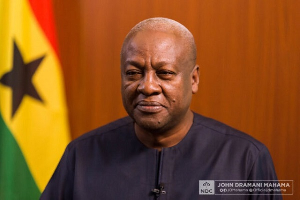 President-Elect, John Dramani Mahama
President-Elect, John Dramani Mahama
2024 witnessed a seismic shift in global politics, marked by the surprising return to power of two prominent former presidents: Donald Trump in the United States and John Dramani Mahama in Ghana.
These victories, seemingly improbable just months before, underscore a complex interplay of factors reflecting a yearning for familiar leadership, disillusionment with incumbent administrations, and the enduring power of political branding in an increasingly polarised world.
In the United States, Donald Trump’s 2024 presidential campaign tapped into a potent wellspring of discontent. Despite facing numerous investigations and controversies, Trump’s unwavering base of support remained steadfast, fueled by a perceived betrayal by the political establishment and a desire for a return to the populist, nationalist policies of his first term.
His campaign successfully framed the election as a battle between "America First" and a perceived "globalist" agenda, resonating with voters who felt left behind by economic shifts and cultural changes.
While his opponents highlighted his controversial rhetoric and actions, Trump’s mastery of media manipulation and his ability to galvanise his base proved decisive. His victory, while narrow in some key states, ultimately secured him a second term in the White House, demonstrating the enduring power of his political brand and the limitations of traditional political analysis.
The Ghanaian election offered a parallel, albeit contrasting, narrative. John Dramani Mahama's victory, after a period out of office, showcased a different pathway to political resurgence. His campaign focused on leveraging his previous experience and promising economic stability and improved social programmes.
His message resonated with a populace disillusioned by the perceived shortcomings of the incumbent administration, particularly concerning economic challenges and rising living costs.
Mahama, a seasoned politician, successfully portrayed himself as a figure capable of navigating complex national issues and delivering tangible improvements in the lives of ordinary Ghanaians.
His campaign capitalised on a growing sense of nostalgia for a perceived period of stability and economic growth under his previous leadership, effectively countering criticisms of his past tenure. The result was a convincing win, demonstrating the enduring appeal of experienced leadership in a rapidly changing political landscape.
The concurrent victories of Trump and Mahama in 2024 highlight several crucial themes in contemporary politics. Firstly, the increasing polarisation of electorates creates fertile ground for the resurgence of charismatic, even controversial, leaders who can effectively mobilise their bases.
Secondly, the role of perceived economic performance and promises of future prosperity remains a paramount factor in influencing electoral outcomes.
Thirdly, the ability to leverage established political brands and tap into nostalgic sentiment proves a significant asset in overcoming challenges posed by recent controversies or past criticisms.
Both elections also served as a stark reminder of the limitations of traditional political forecasting and the increasing unpredictability of electoral trends. In some cases experts struggled to accurately predict the outcomes, highlighting the unpredictable nature of political sentiment and the influence of factors beyond easily quantifiable data.
The success of both Trump and Mahama underscores the necessity for political analysts to consider the intangible elements of political campaigns – the emotional appeal, the strength of messaging, and the ability to connect with voters on a personal level – in addition to traditional metrics such as economic indicators and demographic trends.
The "Year of the Return" in 2024, therefore, stands as a significant turning point, highlighting the unpredictable nature of global politics and demonstrating the persistent influence of personality, branding, and the enduring power of a compelling narrative, regardless of past controversies or perceived shortcomings. The ramifications of these victories will undoubtedly shape the political landscape for years to come.